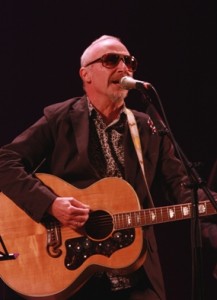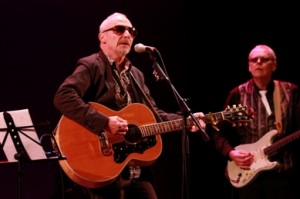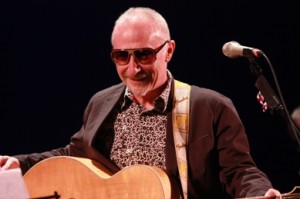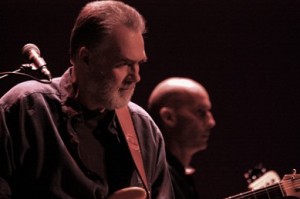BARDAVON OPERA HOUSE
GRAHAM PARKER & THE RUMOUR
Sunday, November 25, 2012
Review by Seth Rogovoy
(POUGHKEEPSIE, N.Y.) – Two great English R&B-fueled rock bands reunited on Sunday night with original members after years – decades in one case — of layoffs. Over in London, original bassist Bill Wyman and long-ago guitarist Mick Taylor helped the Rolling Stones celebrate their 50th anniversary, and by all accounts they sounded pretty good. But here in upstate New York, English expatriate Graham Parker, who now lives in the Woodstock area, took the stage at the Bardavon Opera House on the second night of a reunion tour with his original band, the Rumour, following a 30-year hiatus. And they sounded fucking incredible.
It may well be that the Rumour, as it turns out, is the greatest rock band in the world. There’ve been mutterings to that effect for years, but had you never seen them with Parker (as was the case with me), you’d have to believe this on faith.
Well, I’m here to tell you that these guys were in many ways the equal of, and in some ways, the better than, the Rolling Stones. First of all, they boast simply the greatest bass guitarist in rock. No one has ever driven a band with such power and intensity as Andrew Bodnar does with GP and the Rumour. If you want to know what he sounds like and how musical he is, just think of that opening bass line to Elvis Costello’s “Watching the Detectives,” probably one of the most famous bass riffs in rock history. Costello borrowed Bodnar to play that part. Bodnar is the group’s secret weapon; bizarrely, he is the only member of the group – all stellar musicians – who doesn’t have his own entry on Wikipedia.
As a unit, the Rumour has been compared to the Band as often as the Rolling Stones, but on Sunday night at least, they tilted way towards Stones-style, R&B-derived rock ‘n’ roll. And Graham Parker, something of an unlikely rock star, given his size (guitarist Martin Belmont seemingly towered a whole foot over him) and his nervous, between-song repartee (does he really think we don’t know the names of the songs and what albums they were from, and even if that were the case, does he really need to introduce each song that way, thereby breaking the spell between songs?), once he loosened up proved to have his own moves that favorably compare to Mick Jagger’s chicken-dancing.
But more than all this, of course, Parker is about his voice and his songs. While on record in recent years, even including on the brand new reunion album recorded with the Rumour, Three Chords Good, Parker has begun to sound mellower than in his heyday of the late-1970s well into the ‘80s, in concert Parker sounded like vintage Parker – no one does angry scorn like him (not even Elvis Costello any more). And in song, he is the equal of Costello for his verbal dexterity and felicity, and maybe even the better than the Stones in terms of musical breadth and depth, mining the greater white soul sound to include the influence of classic R&B, Motown, ‘70s soul, and reggae, and to render it all uniquely Graham Parker-style.
While Parker curiously ignored many of his “greatest hits” – or at least the songs that gained him early and steady airplay, including the title tracks “Heat Treatment,” “Stick to Me,” and “Howlin’ Wind,” as well as other worthy contenders including “Stupefaction,” “Don’t Ask Me Questions,” “Endless Night,” or, sigh, the greatest angry rock song ever about a record label, “Mercury Poisoning” (Parker is going to get quickly tired of reviewers complaining about all the great songs he didn’t play, unfortunately) – he showed his catalog to be broad and deep, even without those tunes, or without one of his terrific covers of R&B, such as the Jackon Five’s “I Want You Back” or the Trammps’ “Hold Back the Night” (which was the theme song of my graveyard-shift radio program in college). He pulled out “Get Started, Start a Fire,” “Hotel Chambermaid,” “Passion Is No Ordinary Word,” “Watch the Moon Come Down,” “Discovering Japan,” “Fool’s Gold,” “No Protection,” “Thunder and Rain” and “Local Girls” – not too shabby! And he played about a half-dozen songs of the new album, which fit right in with the old.
Parker began the show playing guitar – acoustic and electric – and singing, but about halfway through he shed his axe and sung without what may have been mostly a crutch. And he was much looser and seemed more relaxed without the guitar, and eventually became so loose he actually started singing with a hand-held mic from the lip of the stage and busting a few moves, sexy yet dignified for a 62-year-old. (Mick Jagger, are you listening?)
Bodnar wasn’t the only standout in the band. All the musicians were great. Guitarists Brinsley Schwarz and Martin Belmont were a fabulous twin-guitar team. They each have their own, distinctive sounds, attack and approach – Schwarz all stinging and snakelike, bright and piercing; Belmont’s is a big, fat, chunky and woozy sound. Keyboardist Bob Andrews added a wonderful honky-tonk and soul feel, and provided pitch-perfect harmonies atop Parker’s growl.
Early on, Parker was touted as England’s answer to Bruce Springsteen (who recorded guest vocals on Parker’s The Up Escalator), and they do share some similarities in their love of R&B, their sense of drama, and even in their descending melodic lines and close early-rock harmonies, especially on “Thunder and Rain.”
That being said, the Rumour is about 100 times a better band than the E Street Band, which as I’ve written elsewhere, is all heart but not a lot of skill (other than guitarist Nils Lofgren, who of course was brought in midway through the Boss’s career because the group needed someone who could actually play the damn thing, and the late keyboardist Danny Federici, who actually recorded with Parker, as did the late Rolling Stones’s keyboardist Nicky Hopkins, after Andrews left the Rumour in early 1980).
The Saratoga Springs-based power-pop trio the Figgs, who functioned as Parker’s backing band for live gigs since 1996, warmed up the crowd with a set mixing classic-rock covers, including the Who’s “Happy Jack,” with the group’s own classic-rock inspired tunes. They were a well-chosen opener, and are worth checking out on their own merits.
Seth Rogovoy is an award-winning music critic and the author of Bob Dylan: Prophet Mystic Poet (Scribner, 2009).





